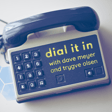
S3 Ep07: The Strategic Costs of Executive Decisions with Monty Fowler
In this episode of the Dial It In podcast, Monty Fowler, Chief Revenue Officer and author of 'Executive Debt: Confronting the Long-Term Cost of Short-Term Decisions,' discusses the concept of executive debt. Monty explains how short-term decisions made by executives can have long-lasting effects on a business’s culture, strategy, and future success. He outlines four types of executive debt: cultural, strategic, operational, and talent debt, sharing insights into how these can be identified and mitigated. Monty also touches on the use of AI to make informed decisions and how inadequate planning and poor decision-making can lead to substantial costs for organizations. The conversation highlights the importance of foresight and structured systems in leadership to build resilient, debt-free organizations.
Connect with Monty:
LinkedIn
Aspire SIx
Executive Debt
…
Dial It In Podcast is where we gathered our favorite people together to share their advice on how to drive revenue, through storytelling and without the boring sales jargon. Our primary focus is marketing and sales for manufacturing and B2B service businesses, but we’ll cover topics across the entire spectrum of business. This isn’t a deep, naval-gazing show… we like to have lively chats that are fun, and full of useful insights. Brought to you by BizzyWeb.
Links:
Website: dialitinpodcast.com
BizzyWeb site: bizzyweb.com
Connect with Dave Meyer
Connect with Trygve Olsen


